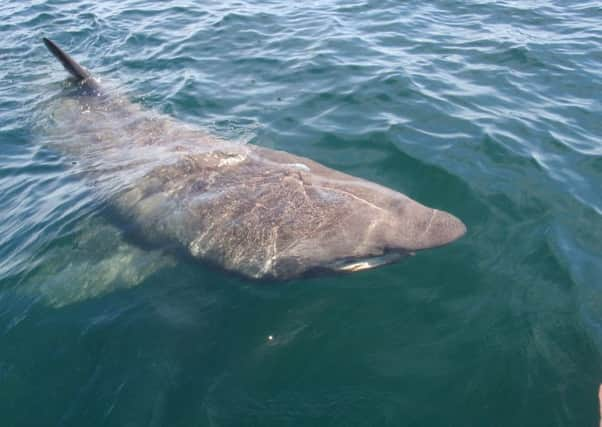Tracking sharks in Sea of the Hebrides


The research in the Sea of the Hebrides will help strengthen the case for protection of these amazing creatures in the area.
Three basking sharks have been tagged by the University of Exeter’s Dr Matthew Witt in the proposed Sea of the Hebrides Nature Conservation Marine Protected Area (MPA), a globally important hotspot for basking sharks which is also proposed for minke whales.
Advertisement
Hide AdAdvertisement
Hide AdThe tags, which are attached just below the dorsal fin, send signals to satellites while the shark feeds at the surface.
Tracking the sharks in this way will enable better understanding of the range and behaviours of these threatened gentle giants.
Members of the public can also see them live on a map at www.mcsuk.org/url/baskertrack.
One of the sharks has already travelled out of the Sea of Hebrides and is cruising south along the west coast of Ireland.
Advertisement
Hide AdAdvertisement
Hide AdStuart McMillan MSP for Greenock and Inverclyde, and Species Champion for the basking shark said: “The Basking Shark is another example of what can be found in the wonderful natural environment we have around Scotland’s coastline.
“It also shows that Scotland’s waters are home to some wonderful creatures. This friendly shark helps bring our waters to life and we are fortunate they have chosen our waters to live in.”
The information collected from this project will also be used as part of the Marine Conservation Society’s campaign to help secure the creation of the Sea of the Hebrides Marine Protected Area.
The Scottish Government was originally scheduled to consult on this proposal, with the first tranche, in late 2013 but this has been delayed twice.
Advertisement
Hide AdAdvertisement
Hide AdCalum Duncan MCS Head of Conservation Scotland said: “We are delighted to be working with the University of Exeter in this exciting project.
“We know that the Sea of the Hebrides provides very important habitat for a whole range of species, including basking sharks.
“Whilst we firmly hoped that the Sea of the Hebrides MPA would have gone to consultation by now, twice postponed along with three other sites, we are confident the further evidence gathered with these tags will make the case to secure it even stronger.
“We urge the Scottish Government to start the consultation on this world-first basking shark MPA as soon as possible”.
Advertisement
Hide AdAdvertisement
Hide AdThis project adds to extensive research already carried out in the area by the University of Exeter and Scottish Natural Heritage, which has so far tracked over 60 basking sharks since 2012, the largest study of its kind in the world.
The team had originally planned to attach this year’s tags to basking sharks in Cornish waters, but the number of sharks visiting seas off South West England in recent summers has been so low that they were unsuccessful.
Dr Matthew Witt of the University of Exeter said: “The Sea of the Hebrides proposed MPA is home to hundreds of basking sharks each summer and so we decided to add these tags to our study to find out more about how these gentle giants are using this globally important area.
“So far our tracking study has revealed that these sharks travel as far as the Canary Islands, Spain and Portugal in the winter, however many reside in the offshore waters to the west of Ireland during this period, before returning to the Sea of the Hebrides the following spring and summer.
“It is important that Scotland protects this precious area for the future of the species.”